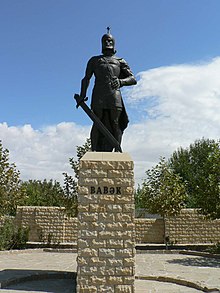巴巴克·胡拉姆丁
此條目需要擴充。 (2018年6月16日) |
巴巴克·胡拉姆丁(波斯語:بابک خرمدین,拉丁转写:Bābak Khorramdin;795年(一说是798年)- 838年1月7日[3]),波斯人,[4][5][6][7][8][9]是位重要的伊朗革命领袖,[10][11]曾引导当地人与阿拔斯王朝进行斗争。他被认为是阿塞拜疆的民族英雄之一。
| 巴貝克·胡拉姆丁 بابک خرمدین | |
|---|---|
 | |
| 出生 | 795 or 798 |
| 逝世 | 838年1月7日(42—43歲)或(45–46岁)[2] Samarra |
| 活跃时期 | 23 years |
| 知名于 | Khorram-Dinān领袖 |
| 竞争者 | 阿拔斯王朝 |
参考资料
编辑- ^ saeed Nafīsī, Bābak-e Ḵorramdīn, 2nd ed., Tehran, 1342 Š./1963, p.152
- ^ Encyclopædia Iranica, "Babak Khorrami" by G.H. Yusofi. [2018-06-16]. (原始内容存档于2018-06-21).
- ^ 3 色法尔月 223 A.H.
- ^ Arthur Goldschmidt, Lawrence Davidson, "A concise history of the Middle East", Westview Press; Eighth Edition (July 21, 2005). Pg 81: "..a Persian named Babak whose rebellion lasted twenty years. Victorious in every battle, these uprisings were inspired by Persia's pre-Islamic religions, such as Zoroastrianism (The faith of Sassanid rulers) and a peasant movement called Mazdakism"
- ^ Whittow, The Making of Orthodox Byzantium, 600–1025. New studies in medieval history, London: Macmillan: 195, 203 & 215, 1996
Azerbaijan was the scene of frequent anti-caliphal and anti-Arab revolts during the eighth and ninth centuries, and Byzantine sources talk of Persian warriors seeking refuge in the 830s from the caliph's armies by taking service under the Byzantine emperor Theophilos. [...] Azerbaijan had a Persian population and was a traditional centre of the Zoroastrian religion. [...] The Khurramites were a [...] Persian sect, influenced by Shiite doctrines, but with their roots in a pre-Islamic Persian religious movement.
- ^ Daniel Pipes, "Slave soldiers and Islam: the genesis of a military system ", Middle East Forum, 1981. pg 153: "Al-Mutasim undertook two military campaigns during his caliphate, the attack on Amorium (a town in Anatolia) and the suppression of the Persian rebel Babak."
- ^ Bernard Lewis, "The Arabs in History", Oxford University Press, 2002. pp 109–110.
- ^ Armenian historian Vardan Areweltsʻi, ca. 1198–1271 notes: In these days, a man of the PERSIAN race, named Bab, who had went from Baltat killed many of the race of Ismayil(what Armenians called Arabs) by sword and took many slaves and thought himself to be immortal... See: La domination arabe en Armènie, extrait de l’ histoire universelle de Vardan, traduit de l’armènian et annotè, J. Muyldermans, Louvain et Paris, 1927, pg 119: En ces jours-lá, un homme de la race PERSE, nomm é Bab, sortant de Baltat, faiser passer par le fil de l’épée beaucoup de la race d’Ismayēl tandis qu’il.. Original Grabar: Havoursn haynosig ayr mi hazkes Barsitz Pap anoun yelyal i Baghdada, arganer zpazoums i sour suseri hazken Ismayeli, zpazoums kerelov. yev anser zinkn anmah. yev i mium nvaki sadager yeresoun hazar i baderazmeln youroum ent Ismayeli
- ^ The Arab historian ʻAlī ibn Aḥmad ibn Ḥazm (994–1064) mentions the different Iranian revolts against the Caliphate in Al-Faṣl fi l-Milal & l-Ahwāʾ & n-Niḥal.
The Persians had the great land expanse and were greater than all other people and thought of themselves as better... after their defeated by Arabs, they rose up to fight against Islam but God did not give them victory. Among their leaders were Sunbādh, Muqanna‘, Ustasīs, Bābak and others.
«أن الفرس كانوا من سعة الملك وعلو اليد على جميع الأمم وجلالة الخطير في أنفسهم حتى أنهم كانوا يسمون أنفسهم الأحرار والأبناء وكانوا يعدون سائر الناس عبيداً لهم فلما امتحنوا بزوال الدولة عنهم على أيدي العرب وكانت العرب أقل الأمم عند الفرس خطراً تعاظمهم الأمر وتضاعفت لديهم المصيبة وراموا كيد الإسلام بالمحاربة في أوقات شتى ففي كل ذلك يظهر الله سبحانه وتعالى الحق وكان من قائمتهم سنبادة واستاسيس والمقنع وبابك وغيرهم »Ibn Ḥazm, ʻAlī ibn Aḥmad, Al-Faṣl Fī Al-Milal Wa-Al-Ahwāʾ Wa-Al-Niḥal 1st, Bayrūt, Lubnān: Dār al-Jīl, 1995 - ^ Bernard Lewis (1991), "The Political Language of Islam", University of Chicago Press, pp 314. "The last and most nearly successful of the Iranian movements, however was that of Babak, who established his independence in Adharbayjan early in al-Mamun's reign."
- ^ Bābak. Encyclopedia Britannica. [2017-01-13]. (原始内容存档于2016-08-10).
来源
编辑- SOURDEL, D. BĀBAK. Encyclopaedia of Islam vol.1 2nd. Leiden: E. J. Brill. 1986: 844. ISBN 90-04-08114-3.